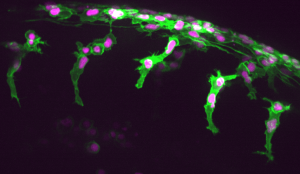Research Assistant/Lab Manager
Posted by Elena Scarpa, on 2 September 2024
Job type:
Location: Cambridge
Closing Date: 20 September 2024
We are pleased to advertise a Research Assistant/Associate position in Dr Elena Scarpa’s group to investigate the role of tissue-scale confinement during in vivo and in vitro Zebrafish neural crest cell migration.
In vivo, cells migrate through tight spaces and may undergo division in crowded environments, both in physiological and pathological contexts, for example during immune cells diapedesis or cancer cell dissemination. These phenomena are difficult to observe in vivo, especially in mammalian models. Key studies in the field have largely exploited in vitro systems, for example culturing cells in 3D collagen matrices or microfabrication of PDMS microchannels, to mimic interstitial confining environments. From this wealth of work, it has become clear that cells experiencing physical confinement during cell migration suffer mechanical stress. This causes deformation of the largest organelle, the nucleus, and loss of nuclear integrity, thus inducing DNA damage. Physical compression can even promote genetic diversity in cancer cells. In addition, when cells in culture undergo mitosis under mechanical compression, they show extensive cortical blebbing and suffer division defects. Together, these findings show that mechanical stress negatively impacts the integrity of the genome and this has been proposed to underlie cancer initiation and progression. However, the consequences of mechanical compression on cells during in vivo cell migration remain so far unexplored.
The post-holder will carry out general lab management roles: they will oversee the maintenance of fish stocks (crossing and genotyping), day to day running of the laboratory (ordering, organization, maintaining reagents stocks, health and safety) and will contribute to the training of students.
In addition, they will be responsible for molecular biology and zebrafish transgenesis. They will characterise the novel Zebrafish lines they generate by live imaging of embryos, quantitative image analysis and immunostaining.
The successful candidate will have, or be about to receive, a PhD in a biological subject, with knowledge of Zebrafish trunk neural crest embryology, cell biology, genetics. They should have experience in Zebrafish embryology and microinjection techniques and/or live imaging of Zebrafish. Please refer to the Further Particulars for a full list of the essential skills and experience required for the role.
Appointment at Research Associate level is dependent on having a PhD. Those who have submitted but not yet received their PhD will be appointed at Research Assistant level, which will be amended to Research Associate once the PhD has been awarded.
Informal enquiries about the position can be made to Elena Scarpa (es697@cam.ac.uk).

Salary: £29,605- £33,966 or £36,024- £44,263
Start date: 1 November 2024
Closing Date: 20 September 2024
Scientific fields: Cell biology, Morphogenesis, Cell fate control and differentiation, Development and disease, Early embryogenesis
Model systems: Zebrafish
Duration: Fixed term
Minimum qualifications: BSc/MSc/PhD

